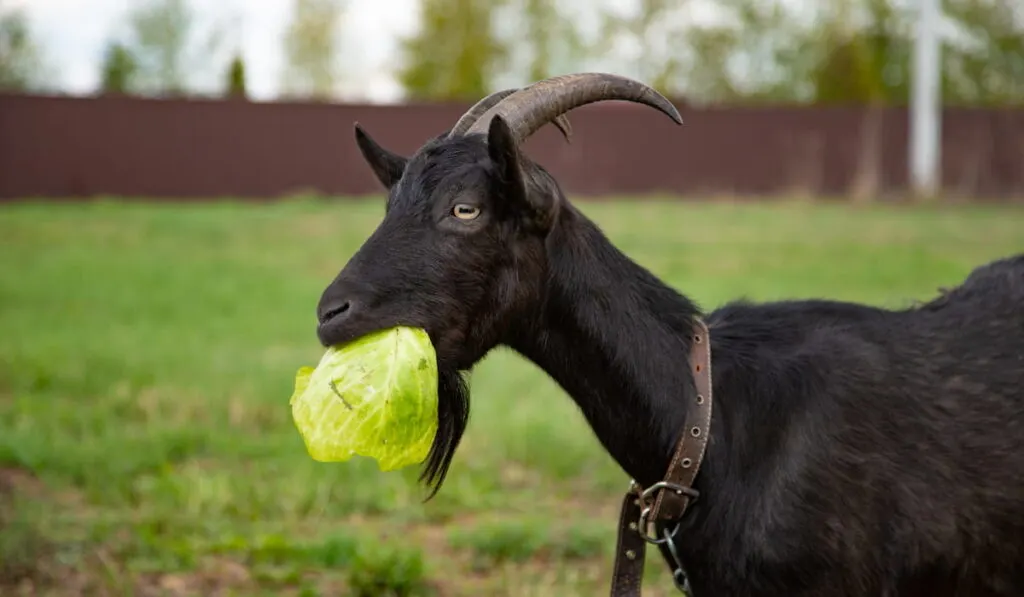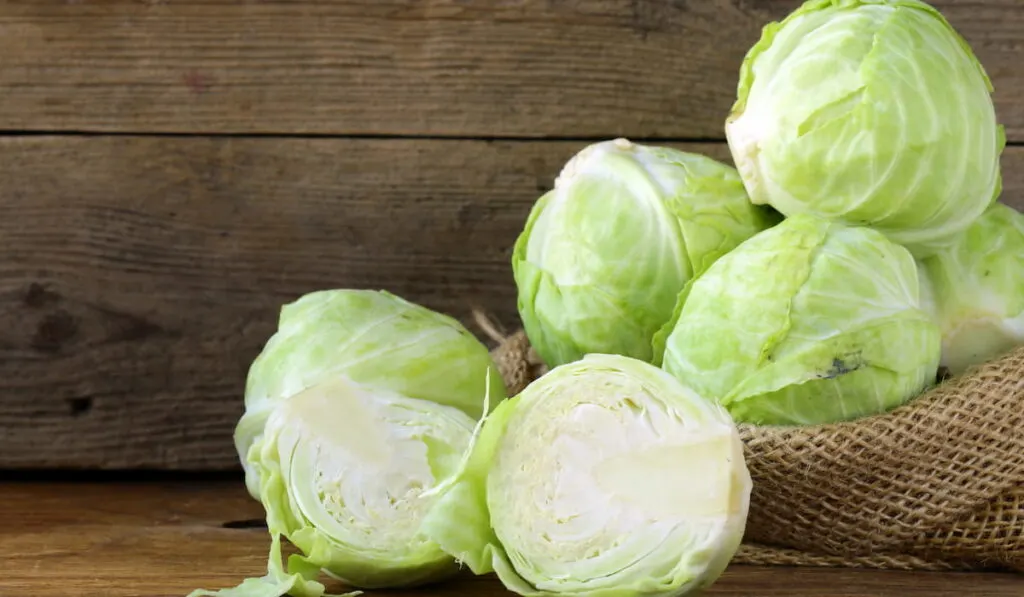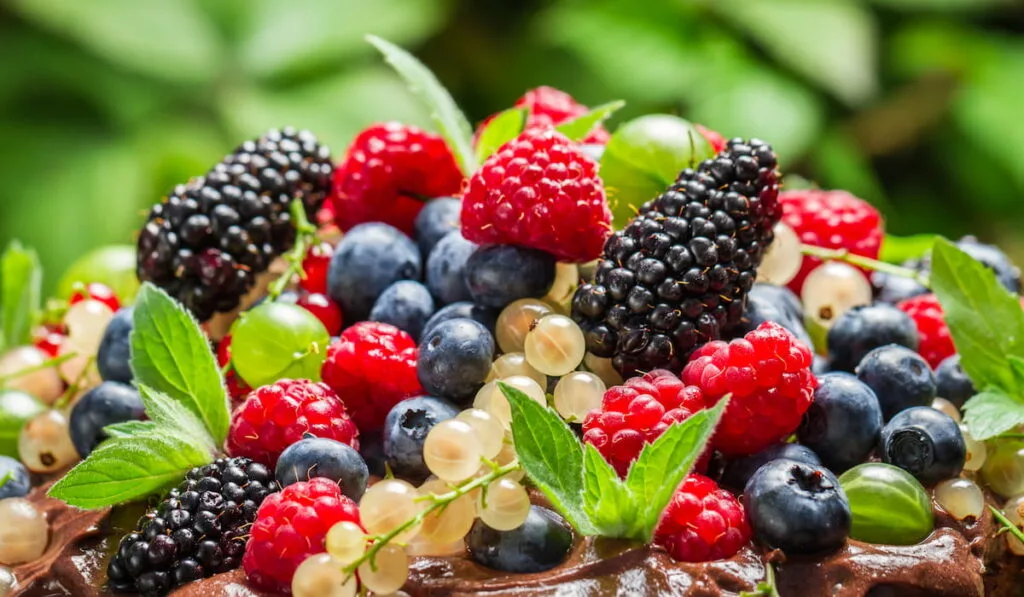Goats are domestic animals which are primarily herbivorous.
That means their main sources of nutrition are leaves, vegetables, fruits, tubers, and other plant products.
The diets of goats are quite interesting for a few reasons.
One of which, as you may have observed, goats are always eating. They are always chewing ‘something’.
This is largely due to the fact that goats have four-compartments stomach and are always regurgitating their food for proper chewing and digestion.
They are known to always eat nutritious vegetables and fruits.
Cabbage is a leafy vegetable that is quite common around the world. They can either be grown in a local farm or industrially.
Can goats eat cabbage?
Yes, your goat can easily eat cabbage with no danger to it.

Cabbage is known to be very tasty and highly nutritious, containing various vitamins that are essential for your goat.
However, cabbage should not be used as a main meal, but as a snack or treat.
Cabbage Nutrition Facts
- Carbohydrates – one of the main energy sources necessary for an animal to develop properly and to carry out its daily activities.
- Protein – This helps your goat in body-building and also helps protect it from immune system deficiencies.
- Vitamin B6 – This is important for aiding brain function and coordination in your animal. It is also important for formation of red blood cells and for maintenance of metabolism.
A deficiency in this vitamin will lead to appetite loss, and fluctuation in blood glucose levels. - Vitamin C – helps regulate different metabolic functions and boost the immune system of your goat, thereby protecting it from common diseases and infections.
Can I Feed my Goat Too Much Cabbage?
The main meal of the goats is hay.
Cabbage serves as a supplement and as a treat. In feeding it to your goat, moderation is key.

Consuming too much can lead to bloating and indigestion.
Cabbage is best fed in bits and pieces.
Other Things To Feed My Goat
Goats are ruminants and are known to eat almost all kinds of food in existence.
If you are not careful, they can easily eat your important documents too. However, just because they’ll eat something doesn’t mean it is safe for your goat to eat.
Below is a list of food you can safely give to your goat:
- Hay – Hay makes up a large percentage of your goat’s diet. It is a main meal and not a supplement or treat.
Fresh weedy hay is quite common and easy to find. It is very cheap and will produce the required amount of nutrients for your goat. Alfalfa hays provide a substantial amount of protein for your animal.
Always inspect the hay to make sure it doesn’t contain mold or dangerous insects that are harmful to your goat. - Pasture – This is a delicious meal option for your goat. It is very nutritious, and helps with digestion. You can feed your goat pasture types such as Sudan grass, sorghum, millet, etc.
Pasture can be in an expanse of land where the goats can easily help themselves. - Chaffhaye – This is obtained by cutting hay or grass into smaller bits and spreading with molasses. The mixture is put in a bag to patch.
This method introduces beneficial bacteria to the feed. These bacteria make it easy for the goats to digest the feed. - Grains – these are an adequate source of carbohydrates and proteins. Goats enjoy chewing and will find grains delightful.
Types of grains that you can feed your goat include, oats, corn, barley, moil, etc. Grains will provide the required energy needs for your goat.
Grains can be given to goats raw or cooked. However, it is not recommended you give grains to your baby goat as they will have a hard time digesting them. - Scraps from kitchens and gardens – These are great for your goats and they are sure to enjoy them. Scraps such as tomato peels, orange peels, skins of garlic, onions, banana peels, etc.
Every day human foods can also be fed to the goat. These include vegetables, fruits, yams, etc.

Things to Avoid Feeding Your Goats
- Meat – Goats are strictly herbivores and should not be given meat of any kind. The digestive system of goats is built to serve the breakdown of plants and as such, they will not be able to digest the meat.
- Berries – Berries should not be given to goats as they are very small and can cause choking. Strawberries are larger but they are very sweet and sour and can cause digestive issues for a goat.
So avoid adding berries to the diets of your goats. Inkberry, China berries, baneberry, elderberry, are poisonous to your goat. - Potatoes – Potatoes are very toxic to goats and indigestible. Even peels of potatoes should not be given to goats as it may lead to severe weight loss if the goat has a protein deficiency.
- Weeds – Not all the weeds out there are safe for your goats no matter how lush and healthy they may look.
|Some weeds are poisonous to goats and they should be avoided at all cost. These weeds include Buckwheat, jimson weed, pigweed, rattle weed, nightshade, milkweed, staggerweed, poke weed, sneezeweed, and more. - Do not give your goats dog or cat feed. They were not produced with goats in mind and do not cater to the digestive needs of goats.
- Other things like azaleas, avocado, chocolate, wild cherries, lilacs, kale, etc. should not be given to goats.
Conclusion
Cabbages are perfectly safe for your goat and they do seem to enjoy them.
Feed it to them in moderate quantities only, as too much may not be good for them. However, cabbages are only supplements or treats and not a replacement for their main meal.
Hay is the primary nutritional meal of your goat.
Goats are interesting animals and can be quite stubborn, so it is important to keep an eye on them to make sure they do not eat what they’re not supposed to.
If you feel your goat has eaten something and you are not sure of its nutritional safety, please consult your veterinarian.
Resources
- https://agricsite.com/can-goats-eat-cabbage/
- https://www.farmersalmanac.com/13-cabbage-health-benefits-26837
- https://www.agriculture.com/livestock/what-to-feed-goats_275-ar41207
- https://opensanctuary.org/article/things-that-are-toxic-to-goats/
- https://opensanctuary.org/article/things-that-are-toxic-to-goats/
- agro4africa.com/food-goats-eat/
